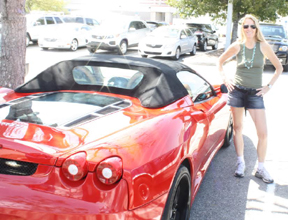Mickey J. Corrigan, whose poem “Sleight of Hand” appears in the July issue of r.kv.r.y Quarterly, is a member of Ink Well Writers, a writing critique group. Under her real name, she has published numerous nonfiction books with Random House, Doubleday, Penguin, Prentice Hall and other major houses. Currently, she publishes fiction with various small presses under her pen name.
Michael Cantwell is a novelist, real estate agent, and photographer. He runs the indie press KSM Publications and has self-published five novels. He is currently working on a series for young readers. He lives in South Florida, where he serves as co-organizer of Ink Well Writers.
Here, Michael and Mickey discuss the difference between traditional presses and the self-publishing options available to today’s authors.
Michael: We have talked often about the pros and cons of traditional versus indie or self-publishing. Why do you still choose to work with publishing companies rather than publishing your books yourself?
Mickey: I’ve worked with publishing houses for many years. I have things I like about them and things I do not like so much. I love earning an advance. I actually used to make a living off book advances and royalties. It’s also great to be able to trust publishing professionals to shape my manuscript into a beautiful book. I like working with professional editors and art departments, the experienced book designers. And it’s always good to have a marketing and sales team to help with getting the book out there.
Michael: I’m under the impression the advances of any substance are tougher to obtain, especially for new authors, and large publishing houses are offering less marketing. Am I wrong?
Mickey: Advances have never been easy to get, especially for fiction authors without a track record. But the size of publishing advances keeps growing. As for marketing, I’ve always done a lot of the marketing for my books. With the bigger presses, you can get some assistance. And you can get the books into the chain bookstores. The ones that are still around, that is.
Michael: So what are the cons of working with traditional publishers?
Mickey: The author has too little say in the final product. Sometimes an editor will herd you in a direction you do not want to go in. Maybe you don’t like a title change or the cover design. Also, the production schedule can drag. It takes a lot longer to publish a manuscript when you’re in a long line of authors at a big house.
Michael: I’m of the opinion that if you are a control freak like I am, and have marketing and computer savvy, you might want to try the indie approach. However, if you are intimidated with the business side of publishing and only want to write, an established publishing house is better for you. Would you agree?
Mickey: No published writer can just write. All authors these days must do promotion, social networking, and marketing for their books. I think traditional versus indie is a personal choice. And it also depends on whether you can interest a traditional publisher in your work. If you can’t, then self-publishing might be your only option.
Michael: At a time when many agencies have limited their client lists or even closed up shop, why would a writer try to find a literary agent willing to take them on?
Mickey: I advise serious writers to at least try to interest a literary agent. If you plan to write more than one book, this is especially important. Having an agent can get you into play with the big presses and that can mean money and a wide audience. It can mean foreign rights and film options. All the stuff a writer’s dreams are made of.
Michael: I would agree. However, writers shouldn’t assume they will find an agent in short order. It can be a difficult and time consuming process. I have sent out queries to agents because I do agree it’s a step worth exploring, even if in the end you decide to self-publish. So, when you work as an editor or ghostwriter, Mickey, do you ever advise your clients to self-publish?
Mickey: If the book is something they are writing for family and friends, yes, I advise them to look into self-publishing. Which is relatively easy and inexpensive these days. But if a writer hopes to reach a wide audience, I suggest they test out the traditional route first.
Michael: We disagree on that. With indie releases ending up on the New York Times best-seller lists these days, self-publishing is a viable option. And it is only going to get more popular. The numbers may be small compared to the overall number of book releases per year, but there are examples of indie books reaching a very wide audience. And let’s face it, not every traditionally published book becomes a big seller either.
Mickey: True, but your chances of reaching readers are still better with the traditional model. If you self-publish, you may be limited to ebook sales, online retailers, and the rare bookstore that carries self-published titles.
Michael: Do you ever see a time when you might consider becoming an indie publisher yourself?
Mickey: You never know. Maybe if I teamed up with the right person…
Michael: As always, Mickey, it’s been fun debating publishing with you. I wish you much success.
Mickey: You too.
Links to websites for Michael and Mickey’s work:



Very informative article. I recently published my first book, My Resurrected Heart: A Codependent’s Journey to Healing. And I am working non-stop to market this devotional memoir that offers hope to other codependents. I chose a Christian publishing firm because they offered the important book buyback program, and that means larger bookstores like Barnes and Nobles will carry my book. But as Mickey said in the article, there are fewer chain stores out there.
My Resurrected Heart is on Amazon, but since the initial roll out sales have dropped. After several emails to local papers, a weekly paper with 135,000 readers printed a very generous article on my book and mission. See following link.
http://edition.pagesuite-professional.co.uk/launch.aspx?pbid=8cfa36d5-b00d-43c3-8fac-398cf2b87549&pnum=35
I am learning if I want to sell my book, I have to get out there and push, push, push my product. Another way I am doing this, is speaking at writer critique groups, writer workshops, and substance abuse recovery centers. At each presentation, I set up a book table and after the meetings I mingle with the attendees. I am always successful in selling books at these events. I don’t get paid to speak, but I also don’t have to pay to rent a table like I would have to at a book fair. And I am selling my book.
Very cool, guys. Thanks!